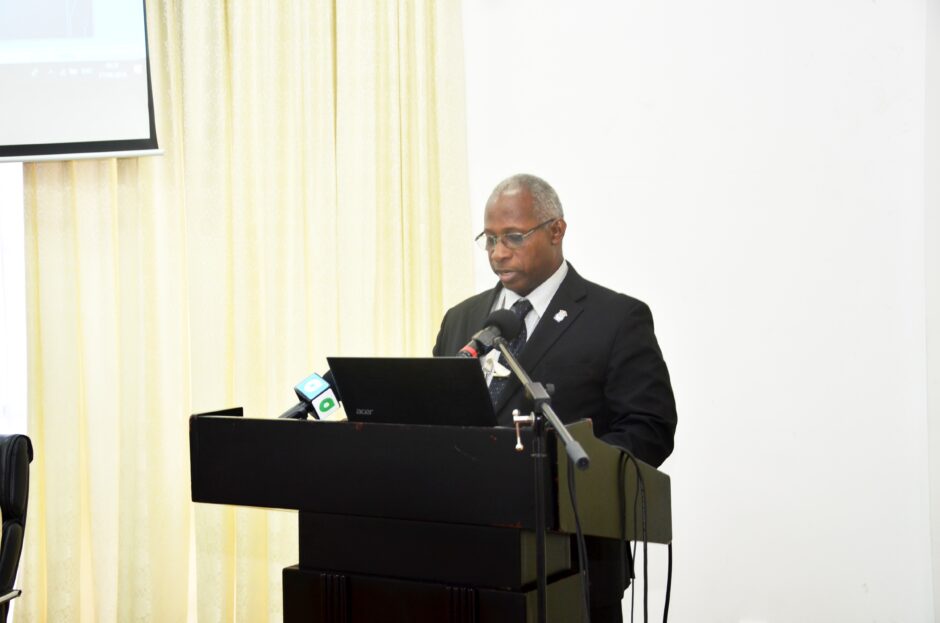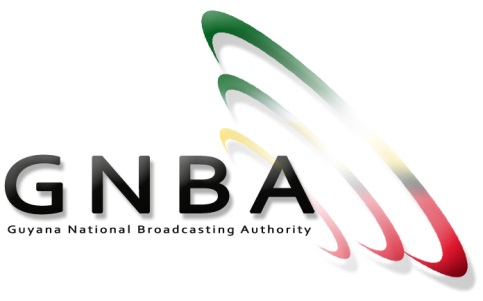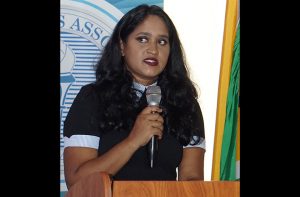
Presentation by GNBA Board Chairman, Mr. Leslie Sobers – GNBA 5th Stakeholder Engagement
https://www.facebook.com/gnbagy/videos/193120961984779/

https://www.facebook.com/gnbagy/videos/193120961984779/

Source: Department of Public Information (DPI)
The Guyana National Broadcasting Authority (GNBA), Chairman, Leslie Sobers has advised broadcasters to follow the principles set out in the Broadcasting Act during their election coverage. At a press briefing on Thursday, he said that radio and television broadcasters need to deliver content that is in keeping with the Broadcasting Act of 2011.
The GNBA head noted the tendency toward elevated emotions during the election period and urged broadcasters to incorporate “a delay mechanism to allow for the screening of inappropriate content before airing.”
Sobers also acknowledged that the constitutionally-guaranteed freedom of expression and the election period create an environment for the airing of political views, but he stated that media outlets must avoid statements that were “likely to rouse clamorous behaviour.”
“It is responsible for broadcasters to ensure that the content delivered to the public is reflective of the principles and core tenets outlined in the Broadcasting Act of 2011. Political candidates will express themselves, and the public must also freely receive these ideas in order to make informed choices,” Sobers said.
The GNBA Head underscored that broadcasters needed to refrain from inflammatory speech, imbalanced or inaccurate information, and language that promotes discrimination or violence.
“What political broadcasters can do is provide information that would enable the electorate to make informed choices, all paid or free broadcasts in support of political parties or candidates shall be clearly identified before and after the programme,” Sobers stated.

Source: Guyana Chronicle
CONSEQUENT upon some citizens making inappropriate remarks during live call-in programmes, the Guyana National Broadcasting Authority (GNBA) is urging broadcasters to be especially vigilant during the elections period.
The GNBA in a press release said that it is cognisant of the reality that during the elections period tensions and emotions are heightened. Thus, it is the responsibility of broadcasters to ensure that broadcast content reflects the principles and core tenets outlined in the Broadcasting Act of 2011.
The GNBA added that it continues to record instances when callers make inappropriate remarks during live call-in programmes and programme moderators fail to caution callers against inflammatory content or to immediately discontinue such calls.
The authority reminded radio stations of the need for stations to incorporate a delay mechanism to screen inappropriate content. Broadcasters are reminded also that they are accountable under the Broadcasting Act and Broadcasting Licence for all content that is broadcast.
Further, the GNBA has observed recently that some stations are airing live political rallies; it is also cognisant of the provision for freedom of expression as guaranteed by the Constitution of Guyana, together with the accepted understanding that election campaigns provide an occasion whereby political views and positions on governance are freely expressed as part of the democratic process. However, utterances that are designed to, or are likely to incite public clamorous behaviour, racial mistrust and misinformation, should be avoided by broadcasters.
Airing live political meetings leaves the broadcaster exposed to broadcasting violations under the Broadcasting Act, which does not cater for the latitude of language used at live political rallies.
Finally, the GNBA said that it remains optimistic that broadcasters will incorporate the necessary systems and practices at their respective stations to ensure that broadcast content is effectively reviewed before screening during this sensitive period in the country.

Source: Kaieteur News
Ahead of general and regional elections to be held on March 2, the Guyana National Broadcasting Authority (GNBA) is urging broadcasters to be especially vigilant during the elections period. According to the Authority, it is cognizant of the reality that during the elections period tensions and emotions are elevated. “Thus, it is the responsibility of broadcasters to ensure that content broadcast is reflective of the principles and core tenets outlined in the Broadcasting Act of 2011. The Authority continues to record instances where callers make inappropriate remarks during live call-in programmes; and programme moderators fail to caution callers against inflammatory content or immediately discontinue the call.”
According to the Authority, it is cognizant of the reality that during the elections period tensions and emotions are elevated. “Thus, it is the responsibility of broadcasters to ensure that content broadcast is reflective of the principles and core tenets outlined in the Broadcasting Act of 2011. The Authority continues to record instances where callers make inappropriate remarks during live call-in programmes; and programme moderators fail to caution callers against inflammatory content or immediately discontinue the call.”
According to the authority, there is a need for stations to incorporate a delay mechanism to prevent the screening of inappropriate content.“Broadcasters are reminded that they are held accountable under the Broadcasting Act and Broadcasting Licence for all content broadcast. “GNBA has observed recently that some stations are carrying live political rallies. Notwithstanding the provision of Freedom of Expression as guaranteed by the Constitution of Guyana, together with the accepted understanding that election campaigns provide an occasion whereby political views and positions on governance are freely expressed as part of the democratic process. However, the authority said, utterances that are designed to or are likely to incite public clamorous behaviour, racial mistrust and misinformation should be avoided by broadcasters. “Carrying live political meetings leaves the broadcaster exposed to broadcasting violations under the Broadcasting Act, which does not cater for the latitude of language used at live political rallies.”
The authority said that it remains optimistic that broadcasters will incorporate the necessary systems and practices at their respective stations to ensure broadcast content is effectively reviewed before screening at this sensitive period in the country.Meanwhile, GNBA disclosed that through its Monitoring and Compliance Department, it continues to observe instances where incitement, vulgar language, inaccuracies and a lack of impartiality, fairness and balance are common features in both newscasts and political programmes. “In addition, a lack of professionalism in the conduct of live call-in programmes is also evident.
The GNBA takes this opportunity to remind broadcasters of the following provisions in the Broadcasting Act of 2011, which prohibit the screening of the aforementioned infractions. In fact, Section 34 (1) of the Broadcasting Act No.17 of 2011 stipulates that with every licensed service “nothing is included in its programmes which offends against good taste or decency or is likely to encourage or incite to crime or to lead to violence or threat to public order or to be offensive to public feeling.” It also stipulates that “any news given (in whatever form) in its programmes is presented with due regard to fair and balanced commentaries and accuracy and impartiality.”
The same regulations pointed out that “due balance and fairness” must be preserved on the part of the licensee providing the service on matters of national, political or industrial controversy or relating to current public policy. “It is the duty of every professional broadcaster to provide the public with information that would enable the electorate to make informed choices during elections. Political discussion or debates involving partisan speakers or on behalf of political parties should clearly be labelled as such. “Race, ethnicity and/or religious beliefs as a basis for denigration of a person’s political affiliation shall not be permitted. All paid or free broadcasts in support of political parties or candidates shall be clearly identified before and after programmes.”

Source: Department of Public Information (DPI)
His Excellency, President David Granger, on Wednesday commissioned Radio Essequibo 95.5 FM, the first radio station on the Essequibo Coast.
The Head of State noted that the occasion was in keeping with the Government’s commitment to bridge the information and communication gap and demonstrated its commitment to ensuring that Guyanese countrywide received equal access to information.


“The government regards it as a constitutional duty to ensure citizens enjoy their freedom to communicate,” President Granger remarked.
He added that the coalition’s objective was to bring about equality and the concept of the Regional Radio Programme does just that. “These changes will make Guyana a more equal society.”
Sharing a brief insight into the Regional Radio Programme, Prime Minister, the Hon. Moses Nagamootoo noted that Radio Essequibo was the seventh newly-commissioned radio station under the Coalition Government.
He disclosed that the idea for regional radio stations was birthed after a conversation with the president, whose vision was to decentralise government services and ensure equal access across the country.
“It is an important development in our country that’s never been contemplated before,” the Prime Minister stated.
Communities like Adventure, Akawini Mission and Bethany to Machabo and Kabakaburi and up and down the Pomeroon River, can now tune into Radio Essequibo 95.5FM. The frequency was turned on by Prime Minister Nagamootoo on November 30, 2019.
The project, which cost more than $12Million, will serve some 46,000 people.
The other six community radio stations are Radio Lethem in Region 9 (May 2016), Radio Maburama in Region 1 (June 2016), Radio Mahdia in Region 8 (October 2017), Radio Bartica in Region 7 (November 2017, Radio Orealla in Region 6 (March 2018), and Radio Aishalton, also in Region 9 (January 2019).

Source: Guyana Chronicle
By Navendra Seoraj
With General and Regional Elections a mere 36 days away, Chairperson of the Guyana Elections Commission (GECOM), Justice Claudette Singh, has urged media workers to be responsible in their reporting, considering the political climate at this time.
“This is not cricket, during cricket season we are all together but I don’t know what takes place during elections…so in the interest of peace and stability, I urge you not to execute your functions at the expense of a peaceful society…resist the spin and contextualise your stories,” said Justice Singh, during her address to media workers on the first day of a media training exercise for elections coverage, at Palm Court, on Saturday.

The media, as the fourth estate, will be disseminating a vast amount of information, with messages specifically targeted at the political parties and their candidates, as well as other key stakeholders such as the electorate. And, Justice Singh believes that it is commendable when the landscape is saturated with election content, which provides knowledge to the citizenry and helps them in the electoral process. The content also encourages democracy and lends itself to advocacy for all of Guyana to participate in the democratic process.
This democratic process will only be achieved through responsible journalism and reporting, said the GECOM chairperson, adding that she has already listened to, watched and read some very “disconcerting stories.”
In her advice to media outlets and in response to such stories, she said: “sensational reporting is irresponsible journalism, particularly when election is just around the corner…such reporting evokes emotion, which will stimulate mistrust and violence, in an already-charged environment.”
Justice Singh urged media workers to be careful in their reporting on any Election Day incident and also encouraged members of the media to stay away from sensationalism and ensure that there is credible information.
“Be aware of hearsay reports…do not report them unless you verified your stories,” said the GECOM Chair. While the media sets out to be balanced and accurate in its reporting, she said, GECOM has many safeguards at every polling station to ensure that there are free, fair and transparent elections on March 2, 2020. Among GECOM’s safeguards are parties, elections’ agents, and local and international observers.
US Ambassador, Sarah Ann-Lynch, in her remarks, said: “we are here because a free and robust press is vital to democracy and good governance…to fulfill its highest civic focus the press must be both independent and unbiased.”
Without independence, a media outlet functions as a public relations mouth piece for whichever government, industry or power interest controls or exercises direct influence over the outlet, said the ambassador.
“Without the careful efforts of editors and journalists to dedicate their professional life to objectivity and unbiased reporting of facts, media outlets would function as purveyors of party propaganda and spin,” Ann-Lynch asserted, adding that, in both cases, whether lacking independence or neutrality, truth can be obscure.
In referring to the 2015 General and Regional elections, the ambassador said assessments of the media environment were conducted by some observers, who later reported that the media was biased in its election coverage.
The observers noted the diverse range of content and opinion across the media, but some of the assessments showed, only a small amount of the coverage was neutral and unbiased.
In encouraging the media to improve, the ambassador said: “this election is your opportunity to turn your page on that history and to more faithfully and convey unbiased information to the citizens of Guyana…in doing so, the press will display leadership role, as the purveyors of facts and balanced analysis on the elections.”
President of the Guyana Press Association (GPA), Nazima Raghubir, who spoke before the ambassador, also made a crucial point about the role of the media, especially during the elections season.
“More than ever, our jobs have placed us in a position to ramp up the level of our fact-checking, put a greater effort into striking balance, digging deeper to present stories with all the facets of fairness and to present information without prejudice.
“This has proven to be very tricky and sometimes dangerous, as journalism battles with social media to present news in real time, break stories in a competing business environment while all doing this with shrinking newsrooms,” said Raghubir.
She believes that credibility is the only value media workers have in their profession and if they are serious about what they do, they should work to ensure that “every box” is checked in order to have fair, balanced and informative stories.
With elections fast approaching, GPA encouraged media houses to do have some introspection and examine how the work of the media can impact on the greater good of Guyana, especially in this period and beyond.
In emphasising her point, she said: “we need to examine whether or not we are writing the real stories that ought to be told; are we covering the real issues tied to elections and the post-election period when the real work ought to begin; are our headlines and sound bites informing our audiences; and most importantly, are we really holding our politicians accountable.”
In that regard, the media training, which was organised by the GPA and the American Chamber of Commerce (Amcham), is geared at ensuring that media understands its role in providing coverage of elections and also understanding its role in the dissemination of credible information in this period.
The programme, which ends today, will also ensure that media workers know their role in fostering an environment of social cohesion, during an often tense period.
